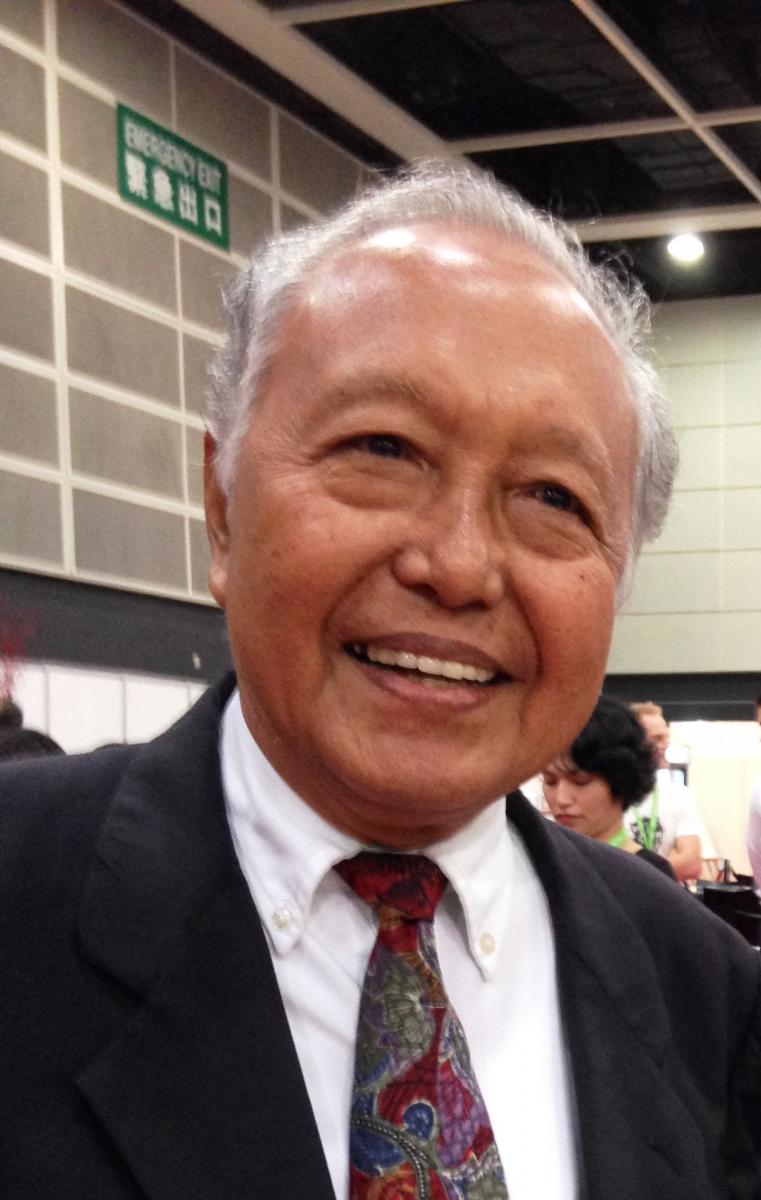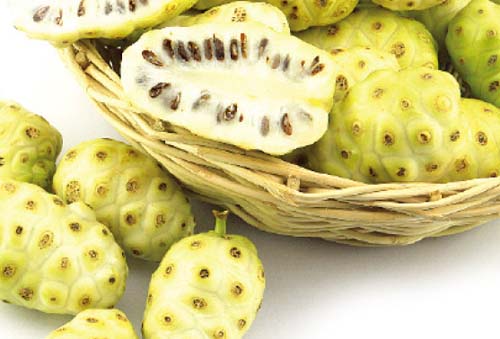A COMFORTABLE life of leisure could have been in the works for Tito E. Contado, Ph.D. over a 15 years ago following his retirement from the Food and Agriculture Organization (FAO). Instead, at 62, he chose to return to the Philippines and go into business. Today, the septuagenarian is the CEO of Philippine Morinda Citrifolia Inc., which produces and exports noni juice under the “PhilNONI” brand. Dr. Contado spoke with FoodPacific Manufacturing Journal about this journey.

Tito E. Contado, Founder & CEO, Philippine Morinda Citrifolia Inc.
FPMJ: You had a career as a professor of the University of the Philippines in Los Baños (UPLB), and then you spent two decades in Rome for the FAO. What was the motivation to start a business instead of slowing down?
I wanted to start a new chapter in my life when I returned to the Philippines. I could have retired anywhere, but I had three compelling questions that I was working on. First, why is it that in the Philippines we have a lot of research in agriculture, in health and so on, but yet we continue to import instead of producing the goods ourselves.
Secondly, why is it the Filipinos do not seem to be interested in entrepreneurship? Entrepreneurs are the backbone of a modernizing economy. They are the ones who produce the goods and services needed by society and in so doing, they create jobs. When society does not have entrepreneurs who produce the necessary goods, then these must be imported and so the jobs are created elsewhere.
My third question was why is it that among all the Southeast Asian immigrants, let’s say in the United States, Filipinos were rarely in business for themselves? They are doctors, nurses, teachers, anything but in business.
FPMJ: And what did you find?
In the Philippines, when you look at our paradigm of science, research, knowledge, and then using that knowledge, it is linear. Science, research, knowledge, and then onto consumers or whoever. Now, in this paradigm, you need people, entrepreneurs or inventors, who transform this knowledge and develop products. For example, in my case I read at least seven very good researches and sources of information about noni, which lead me to conclude that noni can only benefit mankind if I developed a product. Even then, when I was able to develop a product, it still could not be shared with the public, the consumer. Because you need commercialize the product and make it ready for the market, and commercialization actually is more demanding than product development in terms of capital investment, quality control, compliance with regulation, and so on.
FPMJ: Of all medicinal plants found in the Philippines, why noni?
While I came back to the Philippines with the idea of developing products to commercialize, what I originally had in mind when I was in Rome was one that of them would be cacao for chocolate. I actually did not know anything about noni, and I later found out that there were very few studies about noni, although it is listed among the medicinal plants of the Philippines. There are so many studies of other medicinal plants, such as moringa and lemongrass, but none on noni.
But when we visited my wife’s hometown in Leyte province, her older sister -- who was a retired professor of Home Economics - kept talking about noni, and how it had healed her son. He had a tumor and had been operated twice and they were preparing for a third when they learned about Tahitian noni, which was very costly. He found out from [scientific] literature that noni grows along the Leyte seacoast; in fact, about 50 meters from their cottage, there were noni trees. There was a literature that described how the Tahitians made the juice, and he decided to make it himself. After one month of taking the noni juice, he really felt that it was helping. he began feeling less pain and sleeping well. After three months, tests showed that his tumor had stopped growing and six months, it had shrunk significantly and by the time we got there, it had totally disappeared.

Noni (Morinda citrifolia) is an unattractive, bitter-tasting fruit, but rich in antioxidants and considered an herbal medicine in some Southeast Asian countries
FPMJ: So that must have piqued your interest.
Yes. The following day, when I was brought to a noni tree and shown the fruit. I said, 'Oh my goodness, we used to play with this [fruit].' Growing up, we considered the fruits as toys and the wood was cut down for fencing or for fuel. And so, I thought to myself, 'What is really amazing about this?, but I brought a few fruits to take back to Los Baños. At the Tacloban airport, I was carrying a bag of crabs and the crowd of passengers was so thick that we were bumping into each other. At one point, the bag carrying the crabs was punctured, and the sharp claw of the crab punctured my leg and it started bleeding. My wife said, ‘We have no medicine around.’ I said, ‘Oh, but we have a noni. I heard it is good for this.’
I applied the fresh noni on the wound, and immediately it stopped the bleeding. Upon application, I had the sensation of a little pain then slight numbness and then some itchiness. When we arrived in Los Baños, it was as though nothing had happened. For one week after that, I stayed in the library reading and looking for literature, and I discovered that there is none.
FPMJ: How soon after that did you set up your company?
It was in 2001 that I started, and one of the challenges of commercializing is the available technology. This was one of the limitations. For example, when I was developing the product it was a simple matter of squeezing all the juice and straining it through cheesecloth, but there were no equipment to do the same thing for bigger volume. We had to fabricate our gadgets. Importing was not an option, and well, if you look around [for equipment] and there is none, then you have to do it yourself.
So in the end, we had to design and develop our own equipment for expressing and straining the juice with the help of Colleges of Engineering and Food Technology at UPLB. And then we began to make capsules, we also developed the machines to dry and grind the fruit.
FPMJ: Since that time when you had to develop your own equipment, have you invested into more automated processing systems?
Well, I just invested for what we needed. In fact in commercialization, I've noticed that for every product that you have you have to have the separate production line. So, it's not easy to have so many products unless you have plenty of time and effort.
You know, I started with an assumption that my small factory would need a capacity of 10 tons of fruits that we would ferment. I have been expanding it gradually so that today, our capacity is 20 tons of fruits. We now produce about 7-8 tons of pure noni juice, which remains our prime product, a year.
You'll be interested to know that in the development aspect, we pay our fruit gatherers 30 pesos per kilo. In comparison with rice, which is 10-12 pesos per kilo.
FPMJ: How did Haiyan affect your flow of raw material after the super typhoon hit Leyte?
My sources of fruit are now all the way up to Isabela and Cagayan (in the northern Luzon island), but yes, it affected from one source. And whenever there's a typhoon in one region, you know, you wait for more than one year for the trees to start harvesting again. This is the advantage of my sourcing strategy. Instead of putting up my own plantation, which would be wiped out if there is typhoon and finish me off, I have licensed what I call as collectors who strictly enforce the standards to select and screen the fruits delivered to our factory in Los Baños.
FPMJ: PhilNONI and Hong Kong importer, Health Factor Foods Company Limited (MANNA, www.manna.hk), was voted ‘Best New Health & Nutrition Product’ at the Natural & Organic Products Asia Awards last August.
It was a great compliment, because it has been very challenging. In the end I discovered that three things are required: passion for entrepreneurship is a must because it's 24/7; dedication because as an entrepreneur, you are not only looking at one aspect of the whole company but you have to look at everything and you’re responsible for the livelihoods of many others; and that while not everybody can become an entrepreneur, creating small businesses has a very important role in the economy.
Philippine Morinda Citrifolia Inc.
Tito E. Contado, founder & CEO
11039 Kanluran Road, UPLB College
Los Baños, Laguna, Philippines
T: +63 49 5362612 / +63 49 5367180
E: philmorinda@gmail.com; t2contado@yahoo.com

 iConnectHub
iConnectHub
 Login/Register
Login/Register Supplier Login
Supplier Login



























